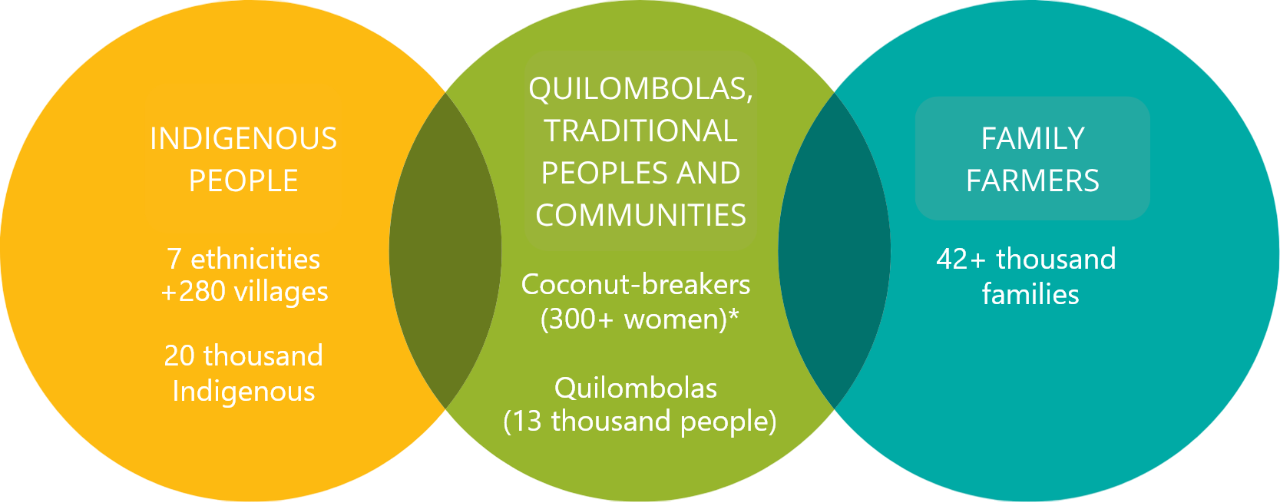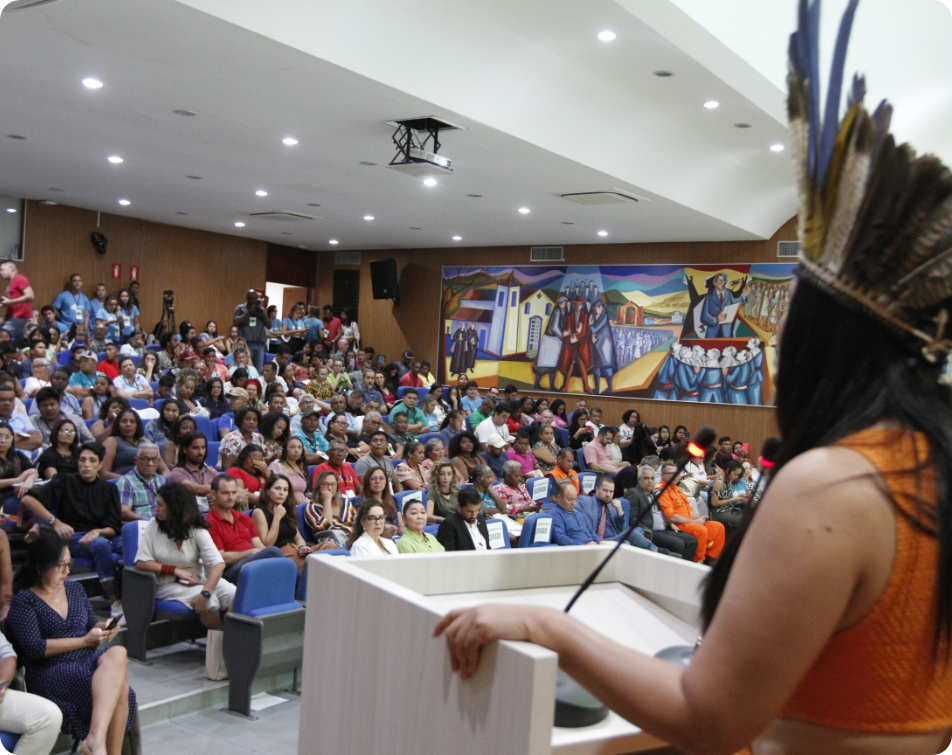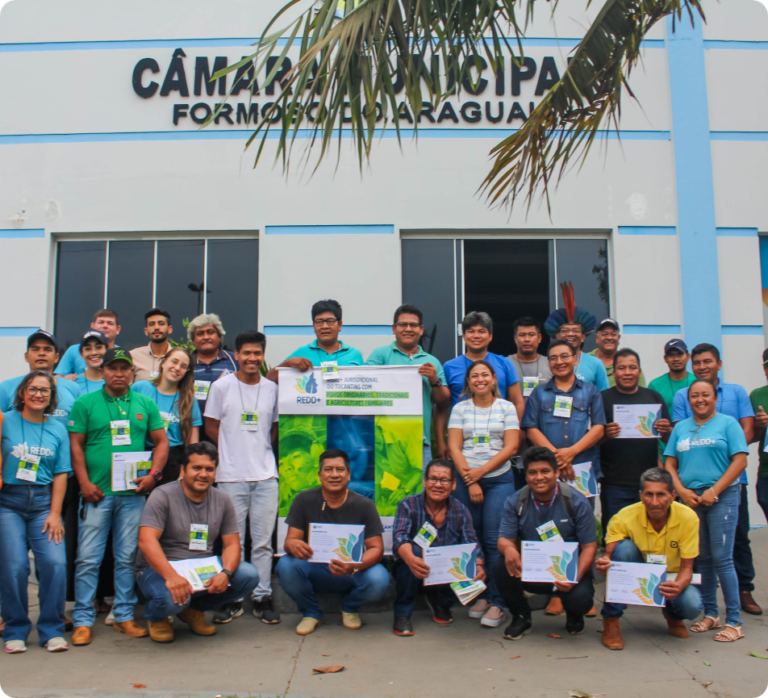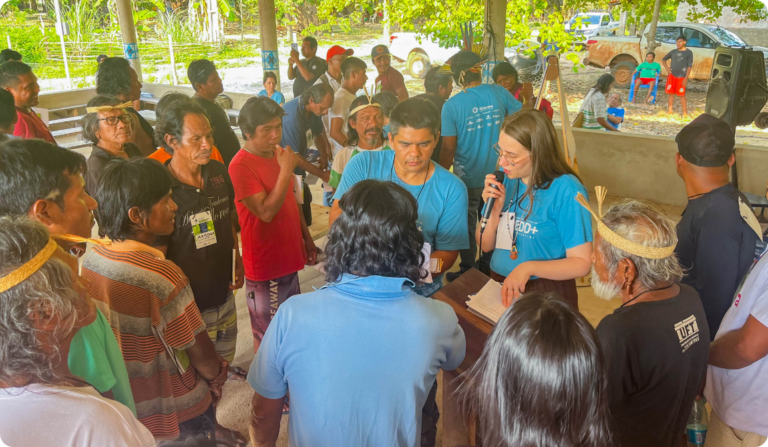The Cancun Safeguards, also known as socio-environmental safeguards, were established during the 16th Conference of the Parties (COP16) of the United Nations Framework Convention on Climate Change (UNFCCC) in 2010, aiming to ensure that REDD+ activities are implemented by countries in an environmentally sustainable and socially fair manner
These safeguards apply to the Tocantins Jurisdictional REDD+ Program, and establish principles that must be followed to ensure that the program promotes biodiversity conservation, respects the rights of indigenous peoples and local communities, and avoids unintended negative impacts.
REDD+ actions should be complementary or consistent with the objectives of relevant national and international forestry programs. In Tocantins, these actions should reinforce existing legal and institutional frameworks, without contradicting them. For example, REDD+ actions in the state should comply with Brazilian environmental legislation, such as the Forest Code and the Law on the National System of Conservation Units.
The governance structures of the Jurisdictional Program must be transparent and effective, ensuring the public’s right to access information. This means that program beneficiaries and the general public must have easy access to program-related information, presented in clear and accessible language.
The Program’s REDD+ actions must promote, recognize and respect the constitutional, legal and customary rights associated with land tenure, formal allocation of occupied lands, self-determination and sustainable use of natural resources by Indigenous peoples, quilombolas, traditional peoples and communities, and family farmers (PIQPCTAFs). In addition, the program must promote the protagonism of these populations.
Adequate conditions for stakeholder participation should be ensured during the formulation and implementation of the Jurisdictional Programme. For example, public consultations and participatory hearings should be conducted so that PIQPCTAFs and other relevant stakeholders can contribute to the formulation of the Programme’s policies and strategies. Stakeholders should also participate in deliberative councils and forums, ensuring that different perspectives are considered in the governance of the Jurisdictional Programme.
The Program’s REDD+ actions must be compatible with the conservation of natural forests and the protection of biological diversity. This means that initiatives must not result in the conversion of natural forests to other land uses. For example, the Program must promote the conservation of existing forests, avoiding their replacement by monocultures.
The Program’s REDD+ actions must mitigate the risks of reversal of the results achieved. Reversal occurs when, after a period of reduction, GHG emissions increase due to a new expansion of deforestation and/or degradation. An effective approach to avoid this regression requires a long-term commitment by the State to conservation, as well as strategic planning that considers the environmental, social and economic challenges behind the dynamics of deforestation and forest degradation.
The program must avoid the displacement of carbon emissions to other areas. Often, reducing deforestation or degradation in one area can increase pressure on the forest in another nearby region not covered by the Program, a phenomenon known as emissions displacement. To avoid this effect, REDD+ activities must adopt integrated territorial planning across the entire state territory, with continuous monitoring of forest cover and strengthening of governance structures.
Learn more
about how
safeguards
are being
met by the
Tocantins
REDD+
Jurisdictional
Program
The participation of interested parties in the design and implementation of the Tocantins Jurisdictional REDD+ Program has been promoted by the State since before the publication of the PEPSA Law, when engagement began with various groups and sectors to formally identify those most pertinent to the Program. From this initial engagement, stakeholder participation became continuous and took place/occurred in the
Program’s various governance spaces. Furthermore, the State deepened the involvement and participation of these groups in the design and implementation of the Program, adopting an action plan specific to the agricultural sector (small, medium and large rural producers), and another for indigenous peoples, quilombolas, traditional peoples and communities, and family farmers (PIQPCTAFs).

The activities planned for both lines of action in reference to the first crediting period of the Program (2020 to 2024) will continue in 2025 with:
Online public consultation:
The proposed benefit sharing strategies and their subprograms will be published on the SEMARH website, with the aim of gathering public feedback on the proposed designs;
In-person public hearing:
At this event, representatives chosen by each group will act as delegates for their groups to discuss and finalize the benefit sharing strategy of the Tocantins Jurisdictional REDD+ Program.
The State has been working with the agricultural sector in partnership with the Earth Innovation Institute (EII) to clarify aspects of the REDD+ Jurisdictional Program and to gather contributions for the design of the Rural Producer Incentive Subprogram, which will benefit the sector with part of the resources from the sale of jurisdictional carbon credits. In 2024, the Program was promoted through participation in events with rural producers.
Additionally, information was collected through interviews and questionnaires with representatives of the sector and carried out during rural services, field days and meetings with Rural Unions from several municipalities in the State. Technical and Management Assistance (ATEG) technicians from the National Rural Learning Service (SENAR) were also trained, providing knowledge about the Jurisdictional Program to be passed on to rural producers served by the service.

*estimate for the states of Maranhão, Piauí, Tocantins and Pará
As the managing body of the program, the Secretariat of Environment and Water Resources of Tocantins officially initiated the FPIC process with the PIQPCTAFs during the 1st Jurisdictional REDD+ Forum of Tocantins with Indigenous Peoples, Traditional Peoples and Communities, and Family Farmers in October 2023.
In 2024, the process advanced with the holding of eleven preliminary meetings with indigenous leaders and two with leaders of traditional communities, quilombolas and family farmers. In 2025, the process will continue with the holding of 48 Participatory Workshops in the territories.
In the context of the implementation of the State of Tocantins’ Jurisdictional REDD+ Program, the Secretariat of the Environment and Water Resources held, on October 17 and 18, 2023, the 1st Tocantins Jurisdictional REDD+ Forum with Indigenous Peoples, Traditional Peoples and Communities and Family Farmers, with the participation of 300 people, including representatives of indigenous communities, quilombolas and family farmers, as well as decision-makers and technicians from federal, state and municipal government departments linked to the Jurisdictional REDD+ agenda.

The event had three main objectives:
During the forum, each group of PIQPCTAFs shared their proposals with SEMARH on how and when the Free, Prior and Informed Consultation (FPIC) process could be implemented in their territories, and offered initial perspectives on the sharing of benefits to which the resources from the sale of jurisdictional credits will be subject.
In 2024, nine preliminary meetings were held with indigenous leaders in their territories and two with leaders of traditional communities, quilombolas and family farmers in Palmas.
The guiding objectives of the meetings were:
Furthermore, the PIQPCTAFs’ proposals for implementing the FPIC process, compiled during the 1st Tocantins Jurisdictional REDD+ Forum with PIQPCTAFs, were confirmed or changed to reflect the most current position of the peoples and communities.
| MEETING | PEOPLE/COMMUNITY | NUMBER OF PARTICIPANTS | DATE |
|---|---|---|---|
| 01 | Apinajé | 22 | 26/09/2024 |
| 02 | Karajá-Xamboiá | 16 | 28/09/2024 |
| 03 | Tuxá; Atkum; Pankararu | 12 | 02/10/2024 |
| 04 | Awá; Kanela; Krahô-Kanela; Krahô-Takagwará | 09 | 03/10/2024 |
| 05 | Xerente | 64 | 27/10/2024 |
| 06 | Kanela | 06 | 28/10/2024 |
| 07 | Javaé | 22 | 29/10/2024 |
| 08 | Karajá da Ilha | 26 | 31/10/2024 |
| 09 | Traditional Peoples and Communities: Agricultural Families | 52 | 04/11/2024 |
| 10 | Traditional Peoples and Communities: Quilombola Communities | 57 | 05/11/2024 |
| 11 | Krahô | 66 | 13/11/2024 |
| TOTAL | 352 | ||
Based on the discussions that took place in the previous meetings, SEMARH and SEPOT prepared the design and a calendar for the 48 participatory workshops that will take place in the territories and will be part of the Free, Prior and Informed Consultation (FPIC) process of the Jurisdictional Program.
These workshops will address the actions already implemented and others planned by the State to reduce deforestation and degradation. The Tocantins REDD+ Jurisdictional Program will be presented again, with information and updates on REDD+, as well as the proposal for sharing benefits, the Climate Fund and the procedures for accessing the Program’s benefits and governance structures.
In addition, the PIQPCTAFs will be heard and suggestions, criticisms or concerns will be collected for improving the Program, especially the benefit sharing strategy and the design of subprograms that will bring investments and projects to support the sustainable development of communities.


The results of these workshops will be: